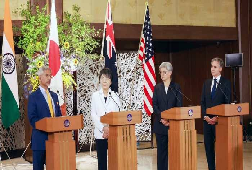In a loud and clear message to China, the Quad reaffirmed its steadfast commitment to a free and open Indo-Pacific and resolved to work towards a region where no country dominates others and each state is free from “coercion” in all its forms. The grouping comprising India, the US, Japan and Australia, after a meeting of their foreign ministers, announced a plan to expand its ambitious Indo-Pacific Maritime Domain Awareness (IPMDA) programme to the Indian Ocean region that would facilitate monitoring the strategic waters.
The Quad also said that it was working for early operationalisation of its South Asia programme through India’s Information Fusion Centre for the Indian Ocean Region. The Quad foreign ministerial meeting also called for upholding the free and open rules-based global order and respecting the principle of freedom, human rights, democratic values, sovereignty and territorial integrity of nations.
Without directly naming China, the ministers expressed serious concern over the situation in the East and South China Seas and reiterated the Quad’s strong opposition to any “unilateral actions that seek to change the status quo by force or coercion.” The meeting was attended by External Affairs Minister S Jaishankar, US Secretary of State Antony Blinken, Japanese Foreign Minister Yoko Kamikawa and Australia’s Foreign Minister Penny Wong.
“All countries have a role in contributing to regional peace, stability, and prosperity, while seeking a region in which no country dominates and no country is dominated, competition is managed responsibly, and each country is free from coercion in all its forms and can exercise its agency to determine its own future,” the ministers said in a joint statement.
It said the Quad continues to advance the development of a “trusted, secure and robust” telecommunication network, and announced a plan to roll out Open Radio Access Networks (Open RAN) in island nation Palau. In his remarks at a press conference, Jaishankar said the Quad is not a “talk shop” but a platform that generates practical outcomes.
In their statement, the Quad foreign ministers also expressed “deepest concern over the war raging in Ukraine including its terrible and tragic humanitarian consequences.” “We reiterate the need for a comprehensive, just, and lasting peace in line with international law, consistent with the purposes and principles of the UN Charter, including respect for sovereignty and territorial integrity,” they said.
The Quad foreign ministers also referred to increasing Chinese manoeuvres in the South China Sea, especially the “dangerous use” of coast guard and maritime militia vessels. “We continue to express our serious concern about the militarisation of disputed features, and coercive and intimidating manoeuvres in the South China Sea,” the joint statement said.
“We also express our serious concern about the dangerous use of coast guard and maritime militia vessels, the increasing use of various kinds of dangerous manoeuvres, and efforts to disrupt other countries’ offshore resource exploitation activities,” it said amid clashes between Chinese and Philippine vessels in the disputed South China Sea.
The ministers emphasised the importance of adherence to international law, particularly as reflected in the UN Convention on the Law of the Sea (UNCLOS), to address challenges to the global maritime rules-based order, including in the South and East China Seas. China claims sovereignty over almost the entire South China Sea, where Brunei, Malaysia, the Philippines, Taiwan and Vietnam have overlapping claims.
The foreign ministers said the Quad is fully committed towards a free, open and prosperous Indo-Pacific. “We reaffirm the Quad’s steadfast commitment to a free and open Indo-Pacific, which is inclusive and resilient, and are united in our commitment to upholding the free and open rules-based international order, with its strong support for the principle of freedom, human rights, the rule of law, democratic values, sovereignty and territorial integrity, and peaceful settlement of disputes,” they said.
The ministers also “unequivocally” condemned terrorism and violent extremism in all its forms including cross-border terrorism. “We strongly reiterate our condemnation of terrorist attacks, including the 26/11 Mumbai and Pathankot attacks and call for bringing the perpetrators of these attacks to justice without delay,” they added.
The Quad urged all countries to take immediate, sustained and irreversible action to prevent territory under their control from being used for terrorist purposes. “We reiterate the call for concerted action against all UN-listed terrorist groups including Al-Qa’ida, ISIS/Daesh, Lashkar e-Tayyiba (LeT), Jaish-e-Mohammad (JeM), and their proxy groups,” the ministers said in the statement.
Quad is committed to international cooperation and working together with our international and regional partners in a comprehensive and sustained manner to strengthen their capacity to prevent, detect and respond to threats posed by terrorism and violent extremism, it said. On the situation in Gaza, the foreign ministers said the large-scale loss of civilian lives and the humanitarian crisis there is “unacceptable”. They also voiced concern over the “worsening” political, security and humanitarian situation in Myanmar, including in Rakhine state.
“We unequivocally condemn the terror attacks on October 7, 2023. The large-scale loss of civilian lives and the humanitarian crisis in Gaza is unacceptable,” they said. “We affirm the imperative of securing the release of all hostages held by Hamas, and emphasise that the deal to release hostages would bring an immediate and prolonged ceasefire in Gaza,” they added.



